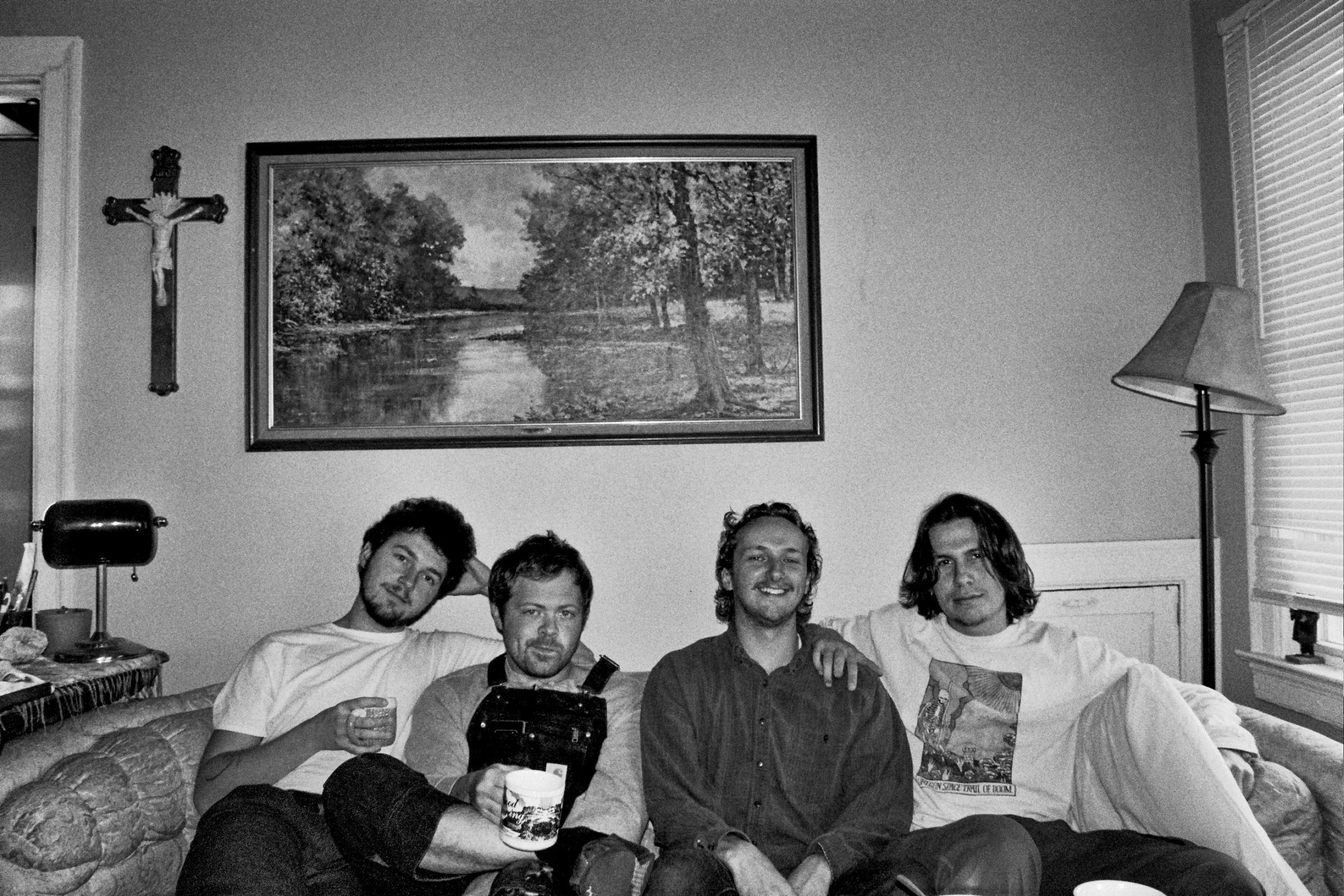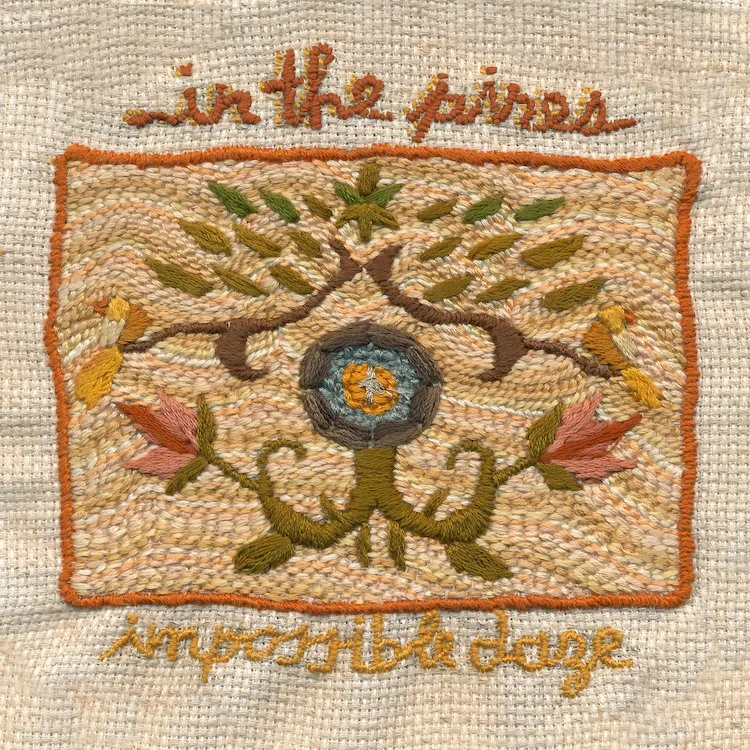In The Pines Invites You to Manoeuvre Young Love and Pandemic Melancholy with "Impossible Daze" (Soul Step Records)
Michael Shular, Charlie Horn, Pat Zopff and Alex Dungan of In The Pines. Photo courtesy of the band
The raw feels of In The Pines’ Impossible Daze will transport you to the Golden Age of Radio, when live bands were broadcasted over the air. Don’t expect the sterile, radio-ready music that replaced many of those old gems; instead, anticipate a constellation of lyrical authenticity, plaintive progressions and intermittent phonographic imperfections.
With this album, ITP veers from the psych-y Laurel Canyon feels heard on Slow Blink to explore a trad-folk sound further consistent with the narrative around the band’s name. While having turned the reverb down a notch, their new 11-track album remains true to the band’s familiar bare-boned and blurred ambient sound. Tape cassette, lo-fi qualities and innocent nostalgia are the names of the game for this quartet, hauling its listeners through what could very well be an Americana music history class.
On Impossible Daze, ITP invites you to manoeuvre love alongside the four of ‘em. The album opens with “Bird Song”, a tune about moving on from an unfathomable reality. Maintaining the same direct-address-POV, “Indifferent” enters head strong. A bluesy guitar riff leads the way, reminding the listener that ITP had begun as a blues band. “Avoid Myself” is for pensive days, as is the track that follows, “In My Dreams”. This one haunts me, beginning with vocals reminiscent of Elliott Smith – but don’t be fooled, this soft tenor whisper soon gets washed away with an intricate cacophony of dream folk guitar progressions and an oppositional outro.
Egg shakers will welcome “Well I’ll Be” to the stage, followed by a tune which showcases the band’s first lap steel guitar appearance, “Brother”. A melancholic “I Don’t Mind” follows, and a starry organ melody seamlessly closes the door to this one. The grainiest track of the bunch, “Jeez Louise”, sports hazy acoustics and atmospheric vocals, while the lyrically spacious and sonically calming “Runnin’ 2 U” wraps up the record. This one reads poetically and leaves the listener pensive: “Can you tell grey from yellow? / Do you hear my hello / My hello / My hello / What will you do when no one comes for you?”
If you're looking for a myriad of what-you-see-is-what-you-get lyrics melted into a complexity of dreamy Americana textures, this album is for you.
In The Pines. Photo courtesy of the band
CJ Sommerfeld for Also Cool Mag: Congrats on the new album, and thanks for your time today.
Before we chat about Impossible Daze, I have to know – does the band’s name relate to the classic folk tune of the same name? If so, what was it about this song that made the troupe name your band after it?
Michael Shular for In The Pines: Thanks for having us! We get this question all the time, and yes, there is a relation to the Lead Belly tune. There is, however, nothing about that song that made us name the band after it, other than the fact that it's a classic blues tune, and we wanted to be a blues band at the time.
Also Cool: Do you have a preference: Lead Belly’s version or Nirvana’s?
Michael Shular: Lead Belly for sure.
AC: A notable transition from 60s psychedelia to Americana is heard between your earlier albums and Impossible Daze. What forces were responsible for this leap?
MS: I think really it comes down to a combination of wanting to do something new and the influence of what we all were listening to or inspired by at the time. We had just finished this sort of progressive psychedelic record that took entirely too long, and we kind of entered a weird stand-still where we were like, “what do we do now?” From there, we went on our way and started writing as we usually do, and a couple of really cool tunes hit the table. We liked where it was going, so we rolled with it.
AC: Rolling with it definitely worked! Were there any prominent Americana / folk albums from which the band drew inspiration when putting together Impossible Daze?
MS: I wanna say John Prine’s self-titled record? I mean, it’s just so good – I remember listening to “Pretty Good” over and over and over again. He's the man. Around the time we were writing the record, we were also listening to a lot of Neil Young, Michael Hurley, Dr. Dog, & Rose City Band.
AC: This is the first In The Pines album in which we don’t hear sax – was this concurrent with the band’s change in sound, or were there other reasons for this instrumental change?
MS: There were other reasons, mostly just wanting to move on and write stuff we never have before.
AC: The sax seems to have been replaced by lap steel guitar in one of your tracks. Was this for the sake of remaining true to the Americana direction in which the band was headed? Or did the idea to create a folkier album occur after having first incorporated lap steel guitar?
MS: Our guitarist Charlie Horn had the idea for the part in “Brother” for a while; we just didn't know anyone who could play! We ended up meeting this guy Jeff Jackson through our engineer on the record; he came to the studio, laid down the part in a couple of takes and up and left *laughs*. It was very fast, but when we heard it on the track it was like a loose end on the record had just been tied.
AC: I love the theme of manoeuvring love heard throughout Impossible Daze. Was this lyrical content taken from the band member’s specific experiences, or was it used simply for its relatable qualities? It’s a component we frequently hear in folk music.
MS: *laughs* I think we all were kind of going through it at the time, you know? We were in lockdown, and everyone—including us—was going through it physically and mentally. All the songs and all of the lyrics you hear on the record are very true, very real feelings, from each one of us.
Manoeuvring the vast landscape that is love and heartbreak definitely has relatable qualities, and it’s because whoever it was that was writing that song at that specific moment in time, they were going through it too! And you can feel that kind of thing when you listen to it. You know it when you do, because it hits that soft spot somewhere in you, because you’ve been there before too. Real human experience and taking it as it is and not what we think of it to be, letting it all go like a leaf in the autumn breeze. That's what most of these songs are about.
AC: Lastly, how is everyone feeling with the folksy route the band has taken? Do you think it’ll remain in future albums, or do you think In the Pines will revert to their earlier psychedelic sounds?
We all enjoy playing these songs and writing songs in that sort of style, it’s a large part of what we all are inspired by. So, yes, I do think there will always be hints of folk and Americana-sounding stuff on future records, but it’ll always be something new.
I say it’s a large part of our inspiration, but it is really only a fraction. I see no boundaries when it comes to writing music in this group. No idea gets turned down, and everything is given an equal amount of consideration. I can guarantee you that our next record will sound like nothing we’ve done before. It’s very important I believe, as an artist or any creative person, to go outside of your comfort zone. Comfort is like the killer of creativity! And you are responsible for developing your craft. I don’t want to be bound by any genre, because what’s the fun in that?
Thanks again CJ for having me for this interview, it was a blast!
AC: Thank you again for your time! It would be rad if ITP made their way to the Pacific Northwest in the near future…
Impossible Daze
Released January 28th, 2022 via Soul Step Records
1. Bird Song
2. Indifferent
3. Sweet Darlin
4. Avoid Myself
5. In My Dreams
6. Well I'll Be
7. Brother
8. I Don't Mind
9. Sylvan Island
10. Jeez Louise
11. Runnin 2 U
Recorded, mixed, and mastered by Patrick Stolley with the assistance of Ion Harris at Future Apple Tree Studio in Rock Island, IL. All music written and performed by In The Pines.
In The Pines
Website | Instagram | Bandcamp
YouTube | Facebook | Spotify | Apple Music
CJ Sommerfeld (she/her) is a Vancouver-based freelance writer with a particular interest in the convergence of language, art and society. When she is not writing, you can find her experimenting with harmonic minor progressions on her keyboard.

































